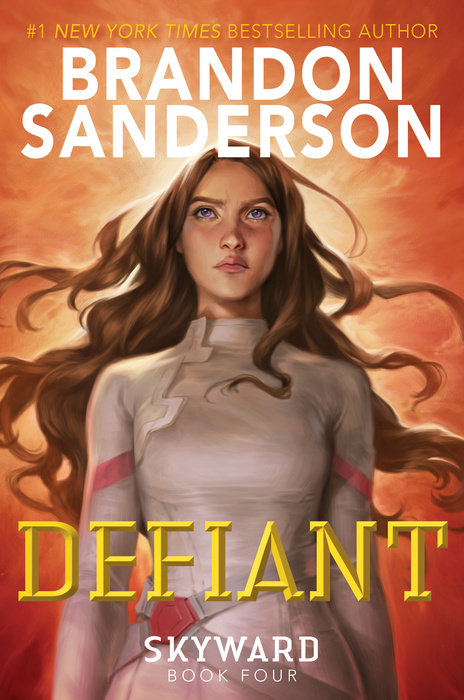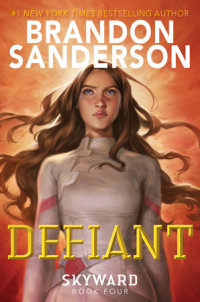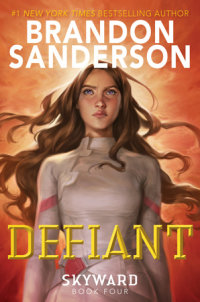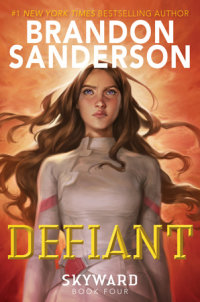Defiant
Defiant is a part of the The Skyward Series collection.
From the #1 New York Times bestselling author Brandon Sanderson comes the final book in the Skyward series--an epic story about a girl who will travel beyond the stars to save the world she loves from destruction, now in paperback!
Spensa has made it out of the Nowhere, but what she saw in the space between the stars has changed her forever. She came face to face with the Delvers, and finally got answers to the questions she’s had about her own strange Cytonic gifts.
The Superiority didn’t stop in its fight for galactic dominance while she was gone, though. Spensa’s team, Skyward Flight, was able to hold Winzik off, and even collect allies to help with the cause, but it’s only a matter of time until humanity—and the rest of the galaxy—falls.
Defeating them will require all the knowledge Spensa gathered while in the Nowhere. But being Cytonic is more complicated than she ever could have imagined. Now, Spensa must ask herself: How far is she willing to go for victory, if it means losing herself—and her friends—in the process?
The final book in the Skyward series will free humanity, or see it fall forever.
An Excerpt fromDefiant
Five hours later, I stood at parade rest on stage.
I’d survived innumerable starfighter battles. I’d escaped the destructive power of the lifebuster bomb by a fraction of a moment. I’d traveled the nowhere itself, teasing out the memories and wisdom of the ancients. I’d looked straight at the delvers—the terrible, eldritch monsters that lived outside of time and space—meeting their eyes and refusing to back down. I was Spensa Nightshade, warrior.
Which meant, I had come to learn, that I was an important political tool.
And so today, instead of being out fighting, I had to wear something far less comfortable than a good flight suit. My chest was laden with medals—I was pretty sure they’d invented a few new ones to give me, just to make me look more impressive. Despite that, today’s ceremony wasn’t about me. I was, like the medals themselves, an ornament. A way to lend credibility to what was happening before me.
Jorgen Weight being named Defiant Defense Force admiral of the fleet. And, since the National Assembly had been destroyed, we were under martial law—meaning that as the DDF admiral of the fleet, he was also provisional head of our government. Until something else could be arranged.
Even with my glimpses of what had happened in my absence, I felt like I was behind. Still struggling to catch up.
Jorgen leaned forward as one of our elders placed the appropriate epaulettes on his shoulders, conferring his new rank. Then he stood up tall. Looking at his strong, determined features, you’d never have known that he’d broken down a few days ago, crying in my arms over the death of his parents. They had been Assembly members.
A part of my soul echoed with the cry of pain he’d made as the blast had killed them. What a fool’s errand that had been. I couldn’t believe the Assembly had really tried to make peace with the Superiority. They’d walked right into that trap. Still, I tried not to blame them. While I’d never gotten along with the Assembly members I’d met, for Jorgen’s sake I mourned. It was a major blow to all of us, not just those who had lost family. It blared out an insult loud as the galaxy itself: we weren’t even worth negotiating with.
Applause erupted in the long, broad hall where we’d gathered for the event. I stood to the side of the stage, along with Kimmalyn, FM, and several other distinguished DDF officers. My spot gave me a good view of the audience, which was strikingly varied. Despite what I’d seen, it was hard to believe that in my absence, my friends had accomplished so much. Two entire planets had joined with us in defiance.
Prominent among them were the kitsen, who stood on an array of floating platforms, with speakers to magnify their chirps of approval. In rescuing their long-lost cytonics, we now had a force of people with powers like my own—if more compact, in their fifteen-centimeter-tall furry frames.
Alanik’s people, the UrDail, were also there—though in smaller numbers. They had violet skin and prominent bone-white facial protrusions. The ones I’d met this week treated me cordially, but I could sense the awkwardness there. Alanik herself was near the front of their group, and although she and my flight had become good friends, she avoided my gaze. Fair enough. I’d impersonated her, and had done quite a bit in her name. Though she said she understood why . . . well, I wouldn’t have liked the idea of anyone running around impersonating me.
Jorgen stood before the crowd, accepting the applause. I could tell from that strained, too-responsible look in his eyes that he didn’t think he deserved it. I was proud of him for accepting it anyway. He had never wanted this; he, like me, just wanted to fly. But I hadn’t heard a complaint out of him since my return.
Someone had to step up and take the lead, and Jorgen was one of our most battle-hardened and experienced pilots. That itself was terrifying, considering his age, but it was the truth. We needed him.
Once the applause died down, FM barked an order, and those of us on the stage snapped to attention and saluted. Jorgen returned the salute, then walked to the podium to make his speech. That was the sign that the rest of us could break salute, step backstage, then make our way to our seats.
I ducked out first, wondering if maybe I could—
“Hey, Spin,” a voice said, and I turned to see Kimmalyn hurrying toward me. Kimmalyn wore her hair long, naturally forming tight curls that reached to her shoulders. She’d been forced to pin on nearly as many medals as me. “You all right?” she asked. “You look distracted.”
“Fine,” I said as others filed around us. Then I just stood there, silent.
Scud. I still didn’t know what to say to my friends. How did I even begin to explain what I’d been through? That I had a delver stapled to my soul? That I’d seen the origins of cytonics, then nearly lost myself in a place where time frayed like the edges of an old coat? That I’d almost decided to stay and abandon them?
“If you need—” Kimmalyn started.
“I’ve gotta hit the head,” I said, accidentally talking over her.
Her expression turned concerned again. Maybe a little hurt that I hadn’t opened up to her, as I once had.
I fled, but not to the head. I got “lost” on the way, and in under ten minutes I was in the cockpit of a Poco starfighter, boosting out into space to do a quick patrol of the region.
It was a selfish move. Someone might notice my empty seat, and it might start rumors. But scud . . . I’d been going to far, far too many meetings lately. One week since my return, and I’d barely had any time in a ship. Plus, I’d heard Jorgen’s speech six times already as he’d practiced.
So I flew, enjoying the sensation of the g-forces pushing me back in my seat. Enjoying the sight of Detritus’s many layers of platforms rotating above me, with the soft blue-grey stone ground extending before me. And in a moment of exultation, I activated my cytonic abilities and hyperjumped toward outer space, just beyond the planet.
The moment I jumped, Chet stirred, his soul stuffed inside my body like a parachute packed in its ejection pod.
I don’t know what to make of my new powers, I thought at him as—once again—we hung in the void and saw only blackness. The other day, I hyperjumped something without touching it.
Yes, he thought back. You are part delver now. Distance and space are . . . not as relevant to you as they once were.
Here, floating for a moment in the nowhere—and once again not seeing any delvers—I felt I understood a little better why I was dangerous to them. It had something to do with my deeper intrinsic connection to the nowhere and the delvers. One thing I’d learned in my travels was that they had hidden away parts of themselves, had intentionally forgotten their pain.
Now that I was part delver, I could see the truth. I could see what Chet had done to hide that same pain. I thought . . . I thought if I could figure it all out, this could be the secret to their destruction. I took a moment to quest out for M-Bot again, but felt nothing, so I completed the hyperjump. I appeared back in the somewhere, in my ship, outside Detritus’s shell. And in that moment I realized something. Why I’d been concerned earlier in the day when Chet had noted the delvers were afraid of me.
He stirred. Yes, he thought at me. Why are you worried? It’s good that they’re frightened, yes?
Good, I thought back, and bad. Chet, they’re desperate. And des- perate people do unpredictable things. I’d spent all this time learning to anticipate them—but now, who knew what they would do?
He settled back against my soul, like a person leaning back in a chair, and pondered on that. Because we were linked, he understood instantly what I meant. And soon I saw that he understood my worry as well.
Still, I tried to put those concerns out of my mind for the moment, so I could just enjoy the flight. Tried to ignore the weight upon my soul. The lingering sadness—though I tried to stamp it out—at having left the nowhere, where I could have explored without responsibility, behind. The worry about M-Bot. The sense of disconnect I felt, returning to a place where time flowed normally.
The implications that I was now one of them more than I was one of us.
My hyperjump, fortunately, gave me something gorgeous to distract me. We were in orbit around Evershore, the kitsen homeworld. A vibrant blue planet, like all the old pictures of Earth, with clouds and seas and life. It was breathtaking.
I soared through space between the two planets. Detritus, it turned out, could move. There was a reason it had been built with its own protective shell, able to maintain its warmth and a day-night cycle far from any sun. It was an enormous battle station, capable of using cytonics to hyperjump around the galaxy. Indeed, many of its platforms could move on their own, like smaller battle stations.
All the planet had needed was some maintenance and a whole lot of alien slugs. Fortunately, we’d managed to provide both.
Our homeworld was even more amazing than we’d ever known. It had provided a haven to slugs—hundreds of them hiding in the tunnels far beneath the surface. Thinking of that made me reach out to Doomslug, and I sensed her spike of joy at the contact. She sent me an image of a large room on one of the platforms, where she was being cared for. Dozens of slugs—of several different varieties— populated this room alone, with human caretakers engaging with them.
Doomslug was hiding in the corner with a little bowl of what appeared to be caviar. She perked up at my contact, and sent me an immediate emotional barrage of relief. After my time in the nowhere, I was getting better at understanding her—and these days I could make out basic words from the impressions she sent.
I thought you would be happy with the others, I sent, remembering her joy at first seeing all those other slugs.
Happy. And not happy, she sent back.
Why?
Confused, she said. Feel lost still. Feel alone still. Feel strange.
I immediately recognized that sensation: that feeling of no longer belonging. Of seeing things . . . differently from everyone else. Of being an oddity. I sent her welcoming thoughts, and in a moment she was in my lap. I hoped that wouldn’t cause the caretakers too much concern—I would have to send them a message. But I suspected the caretakers were accustomed to it. I’d heard from Rig and FM that caring for a large group of intelligent interdimensional teleporting slugs was proving . . . interesting.
Together, Doomslug and I flew through space, pretending it was the old days. I accelerated us to incredible speeds, impossible in atmosphere, and enjoyed the sensation of doing maneuvers between two planets. My brain kept panicking as it tried to track which direction was up, and I found it a neat sensation. Not too different, actually, from flying in the nowhere.
Unfortunately, duty soon came calling. My comm blinked, and a moment later Jorgen’s voice came through the earpiece of my helmet.
“Spensa?” he asked. “Are you flying?”
“Patrols,” I said. “Who can say when the Superiority will attack, you know?”
He seemed to understand, because he chuckled softly. “Feeling better?” I asked. “Now that it’s over?”
“I would be,” he said, “only now I’m officially in charge. Which means I have to do something about our predicament.”
“Fortunately, you don’t have to do it alone,” I said. “Which is . . . why I’m calling you.”
I let out a deep sigh—but for his sake I muted myself first. I took my finger off the mute.
“What do you need?”
“A meeting,” he said. “To discuss our options, and to plan our strategy.”
“Today?” I asked. “You just got promoted. Shouldn’t there be, I don’t know, a party or something?”
I knew him well enough to predict his response. In fact, I could have mouthed along.
“We can party once our people are safe,” he said. “I’d like you there, Spin. Your perspective is essential to our strategy.”
A dozen excuses popped into my head. They were all stupid. He was right; I was needed. Doomslug, sensing my emotions, let out a soft fluting sound of sympathy.
“When?” I asked.
“Fifteen minutes?”
“I’ll be there.”




